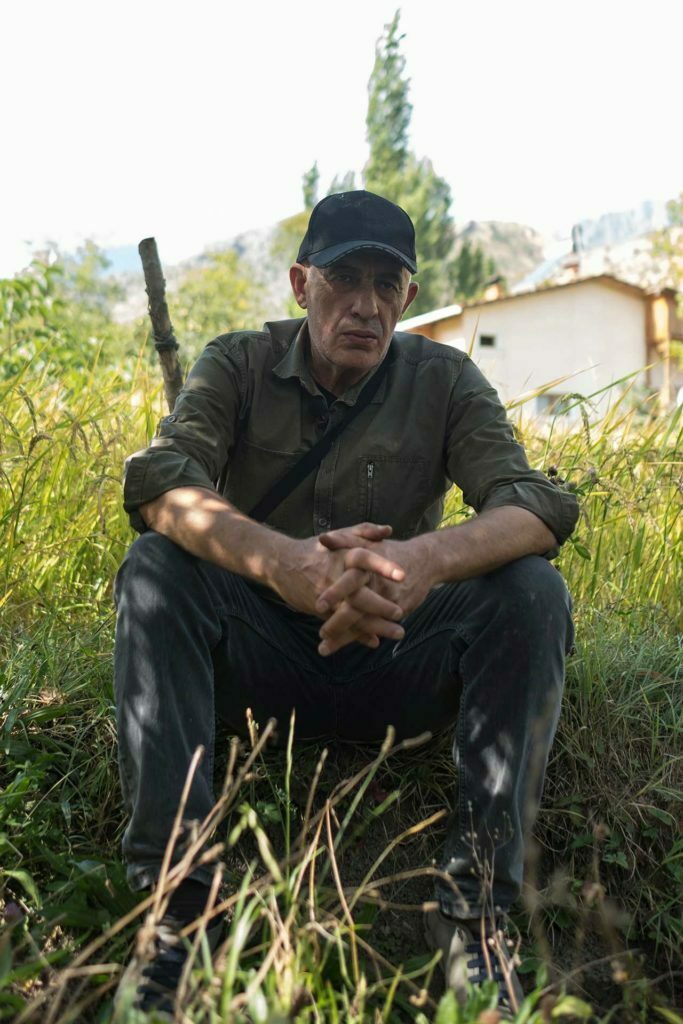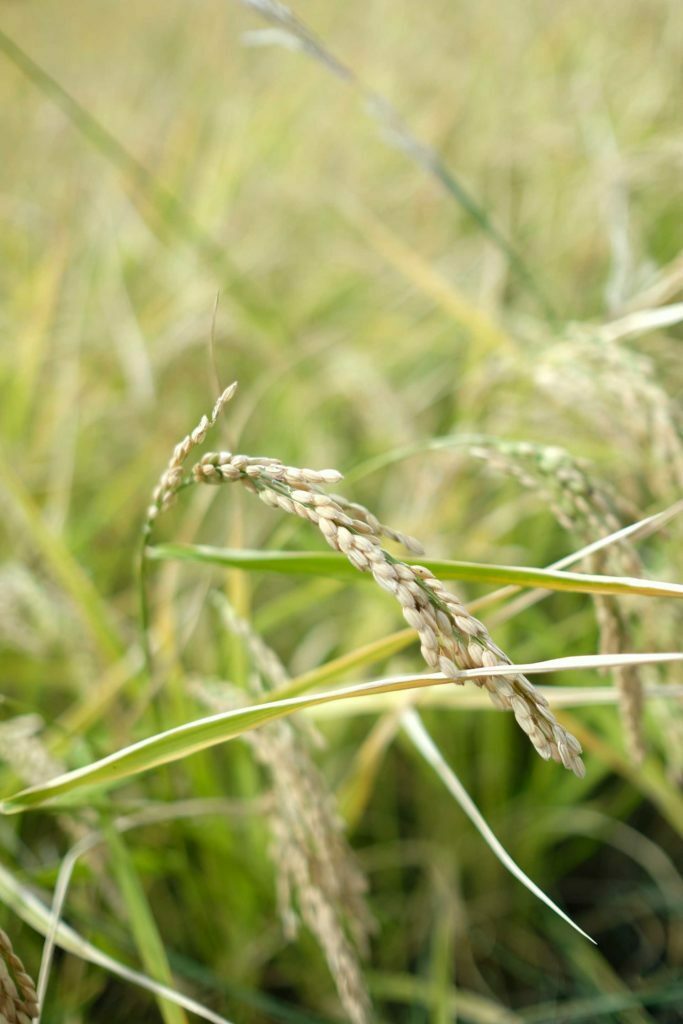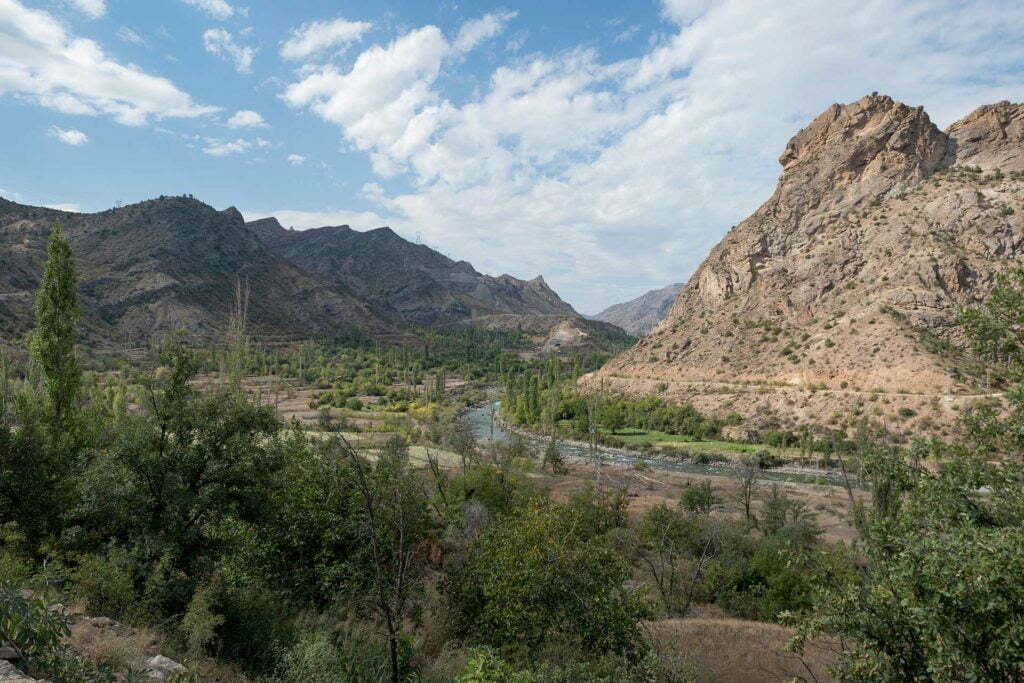After retiring from civil service in Bursa, Ayhan Kaleli started looking for ways to spend more time in his village in Artvin and hence found his way to paddy farming. He practices clean agriculture with ancestral seeds in the village of Yokuşlu located in the Yusufeli district, and sells the rice he produces to food communities in various parts of Turkey. We had a chat with Ayhan Kaleli, who precipitated the return of 18 more families to the village, while strolling amidst paddy fields after having a healthy and delicious meal cooked with home-grown Yusufeli rice.

Can we get to know this place?
This is the Yokuşlu village, in Artvin’s Yusufeli district. Nihah by its old name, which means “land of vineyards” in Armenian. There were 5 or 6 Armenian families living here, then they left with the Relocations (Tehcir). This is the last village of Artvin’s Yusufeli district. Its history is unknown. It’s a very old settlement. It’s not just a vineyard either, we have villages and highlands further up.
How did you decide to return to the village?
After retiring from civil service I would already come to the village in the summers. At one point I said, let me find an excuse to stay longer, plant a crop that would take a long time to harvest, like starting in April and going until November so my children wouldn’t be mad at me. With this excuse I came over and started farming. I rented many of the empty spaces. People had grown old, they couldn’t grow crops anymore, so I rented from them. I hadn’t ever severed ties with my village, but I needed an excuse to come back, and rice farming gave me that excuse.
Is there a tradition of rice cultivation in Yusufeli?
Its history dates back to the early years of the Republic. We don’t know when exactly paddy first came to this country, but we do know rice was an important input for our country and the people of this region. Later on, due to massive waves of migration in the region, rice farming was almost completely wiped out. In Yusufeli, there used to be paddy fields in 14 of our villages, but after the dams these were confined to three villages. It’s a challenging crop to cultivate, people have grown old, after so many migrated away they just stopped growing it. We thought we would come back to the village, but create an alternative model to grow Yusufeli rice as clean food, in clean conditions that are appropriate for the region.
Why did you prefer clean agriculture?
Our future depends on raising healthy generations. Everybody who knows is responsible in this regard. We too wanted to contribute by producing clean food. You might notice that the soil here is alluvial. This is ideal for paddy farming. It’s aluminium-rich soil formed by flooding from the Çoruh before the Çoruh was gone. Now it is no longer sustained by the Çoruh, but by soil carried by this stream over there.

Our paddy is local, it’s our ancestral seed cultivated entirely using clean agriculture. You see the beauty of the grain husk. There are no additives in it. Here we let the land lie fallow for a while, and after resting, rice grows in its own natural way. It isn’t processed; it’s high quality rice ground using quern-stones. Since we use no pesticides, the rice would be contaminated by weed seeds, if we used pesticides there would be none. These weed seeds are removed by a winnowing machine and the paddy is decontaminated. It’s far from flashy, but what we end up with is a clean product.
In the future paddy fields will proliferate, but what we take great pains to prioritize is clean production. To produce clean foods that don’t harm human health. We pay more attention to bringing clean food to people than we do to productivity. And in addition to that we care about creating employment. We have succeeded to some extent, but this is just the beginning. I believe better things are on the horizon.
Did you face difficulties?
In the first year we faced many difficulties. For instance, here there aren’t many incentives available for small scale farmers in rice farming. There are the big farming machines – imported machinery worth trillions. Here we need small, simple and practical machines, but we aren’t able to procure them. We started this job, who knows how long I’ll be able to keep going, it’s truly a very arduous crop. What we need is small, easy-to-use farming machinery. They have them in Bangladesh and in India. In our country there are no small combine harvesters, no small agricultural machines. The rice farming here happens with quern-stones. If we were to make things a little bit easier, transition to partially-mechanised agriculture, these empty lands would be returned to agricultural use and this is very important my friends. Our one advantage is that we have easier access to animal fertilisers than other farmers. We have opened our barns up to animal husbandry. Animals are raised on pasture instead of using ready-made, industrial grain. As a result, we obtain fully natural manure for fertilising purposes
What kind of impact has this clean agriculture venture of yours had on the region?
After we started producing clean food in paddy fields, new areas opened up for use. Before that this area was empty, it is now allotted to paddy farming. Once we promoted the product, rice cultivation really took off. People came back to their land, production resumed. We went back to the good old days. Even though we have some small troubles here and there, things are going well in terms of the rice growing. We saved it from oblivion, and in the future will further improve it.
To whom do you sell the rice you produce?
We don’t have problems in terms of finding a market. Thanks to our caring, environmentalist friends, people with an ecological awareness regarding clean agriculture, food communities and cooperatives who always rise to the occasion whenever I take a step back – they keep saying, “Brother Ayhan, don’t step back, keep going.” We send products to the cooperatives of Kadıköy, Istanbul, Boğaziçi, Beşiktaş, Maltepe, İzmir Ege University, Adana Çukurova University, the food communities of Mersin, İzmir and many others. What keeps us going is their encouragement, if not it is a truly exhausting crop to cultivate.
What kind of advantage does sending products to food communities bring to someone farming here?
The market for rice expands, you have an incentive to keep producing. In the past, you would cultivate the crop and then end up stuck with it. For 3 or 5 years it would get sold dirt cheap. We were the ones who started the return to the village program here. We argued that those who were able-bodied and had qualified for social security payments should come back to their village – and we gave examples. In the last decade 18 families have returned. 18 families came back, but they have the option of coming in the summer, working the land, and then going back to the city in the winter. They do their cultivating, obtain their food product and go back. An even greater number could return, but I stand for the return of those who are fit for work. I don’t want people who will amble around aimlessly. I don’t want that myself, in my own mind. They come and plonk themselves down in coffeehouses all day long. We got together as the people who stayed here, saying let’s cultivate rice or let’s cultivate beans, but let’s do it on our own terms. What are these? Clean agricultural practices, we said let’s produce clean crops.
How are agricultural fields in Yokuşlu impacted by the dams?
The dam up there (the Arkun Dam) doesn’t release water in every season. It’s called a discharge; when meltwaters overfill the dam in the spring floodgates are opened. Then fields in the floodplain of the Çoruh up to a certain altitude are partially submerged for a month’s time. I don’t know how this could be avoided. Could this water be discharged elsewhere? Even if so, there would be value in releasing the waters of the Çoruh into this valley – their true, original valley – at least once a year. It does cause some minor harm, but at least when the floodgates are going to be opened they warn us for days and announce it everywhere. Then the gates stay open for 10-15 days and the Çoruh flows on from here replenished.
What is the importance of the Çoruh in paddy farming?
The Çoruh River has its advantages and disadvantages. Its advantages are that the water comes from the dam, from 40 metres below, and it is cold. Trout have started living here – meaning the water is clean. Its disadvantage is that this area used to be nourished by the alluvial deposits carried by the Çoruh, but it is no longer. So this creates the need for highly costly supplements to the soil, including fertiliser.

Why is it that alluvial deposits no longer nourish the area?
The dams stop soil sediments resulting from erosion carried along the river. So this soil is now accumulating in the dams. Those alluvial sediments are actually very valuable, highly conducive to rice farming. But they don’t flow down here anymore. A cold, icy water reaches us. Something like rainwater. But it is drinkable and fit for use. Trout have even started living in it.
How did the people of the region initially react to the Yusufeli Dam?
Our people have this kind of approach when the state is doing something, the common form of thinking is akin to ‘the judgment of God doesn’t hurt’. That was what happened here. The state wants to undertake this project, the state is doing it, so then objecting to it is a shame, it’s a pity, it’s basically treason. We became bona fide traitors back then for defending our rights – even though we come from a family that made sacrifices for this land. Nobody objected really. There weren’t more than 15-20 people standing up against the Yusufeli Dam.
People didn’t react even though the entire town would be submerged under the dam?
People were pushed into uncertainty and hopelessness. Lands have been abandoned here since 1974 on the premise that a dam will be built so there is no point in staying. Those who had left their land behind thought, we’re not farming on it so we might as well get compensated. So there wasn’t much resistance in Yusufeli. Those who resisted were a small minority. Along with this were court proceedings, information sessions in the big cities, but we never achieved a real result.
There are dams and hydroelectric power plants (HEPPs) built on the Çoruh before the Yusufeli Dam. Didn’t people think, “This river has done enough for energy production, there is no need for one more”? Or, rather, were there those who drew the connection between this and other dams?
The official tune that was concocted and circulated was: One dam completes the other, without the Yusufeli Dam the others are useless. On top of this was the fact that people didn’t think about long-term effects because they were going to get paid and have new job opportunities. Just as they didn’t think long-term, they also didn’t consider the destruction of nature, endemic species, tourism potential and world heritage. All they thought about was money. Sadly, we also saw those who had migrated away take positions against us, saying “If my land isn’t being cultivated, it might as well make money some other way.” Many information sessions were held, many academics came, but to no avail. We did get results through legal action though, the dam project was cancelled. Then a new tender was put out, and the contract awarded. I, for one, don’t believe that these dams will generate electricity and fill up. So I say, it’s a pity what was done to Yusufeli.
The Çoruh is a transboundary river. Was there ever a discussion on water usage rights for Georgia?
The first dam was built during the presidency of Süleyman Demirel, with a joint agreement between Georgian President Eduard Shevardnadze and the government of Turkey. I don’t see this in terms of Georgia or Turkey honestly. I see it in terms of world heritage. This region should not have been destroyed. It’s a truly unique valley that enjoys its own micro-climate. Scientists say that many endemic plant species will become extinct. Yusufeli will lose 14 villages to this dam. These villages are Yusufeli’s buttresses. Situated on the riverbanks, they are the largest villages in the district. I don’t believe that the district of Yusufeli can stay in existence – with nothing but a couple of mountain villages to its name – after losing these. It won’t be able to survive the loss.
Do you feel any climate change here?
We feel it as high humidity. We’ve lost the rains. They’ve slipped away, retreated further up. I don’t know why, maybe it’s the atmospheric pressure here, but we’ve experienced a meteorological shift, and it has started raining less. The second thing is more humidity is forming. And the third is that snow, which recharges groundwater aquifers here, no longer falls in certain areas and the difference between day and night temperatures has changed a lot – it has grown. If it is 40 degrees during the day, it falls to 8 or 10 degrees at night.
What kinds of measures can be taken from now on to preserve this place? What can be done for the people living here?
We need large-scale social welfare projects, ‘return to the village’ projects. Here people don’t want anything really. All they say is, “Let the state cover our insurance fees, and we’ll start animal farming here”. What they want is social security. Due to massive waves of migration, top grade agricultural land in villages higher up, at an altitude of 1500-2000 m. are completely abandoned. There could be a return to animal husbandry. Pasture farming has died out here. Sheep and goat farming could be revived – that too is a dead practice. Grains and fodder plants could be sown again. We are one of three villages that haven’t been submerged in this area. We are able to cultivate crops here, but the real disaster befell our villages higher up. The fields are empty, the villages are derelict, and there is no cultivation. I have made no requests from the state, at least up until today, when it comes to agriculture and animal farming. I even refuse what the state pays us in grants. The least they can do is produce machinery that could help us small-scale farmers in our work, and we could pay the price and buy them.